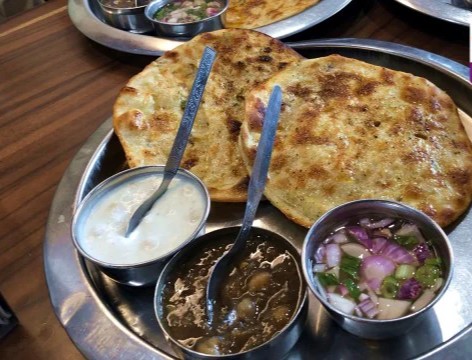When it comes to Indian food heritage, few dishes are as iconic as the Amritsari Kulcha. This stuffed bread from Punjab is loved for its crispy texture, buttery layers, and mouthwatering fillings. But beyond its taste, the Amritsari Kulcha is now in the spotlight for another reason — Punjab’s efforts to secure a Geographical Indication (GI) tag. If granted, this recognition would not only safeguard the cultural identity of this dish but also highlight the growing importance of GI tags in India.
What is a GI Tag?
A Geographical Indication (GI) is a form of intellectual property protection that links a product to its origin. It ensures that only producers from a specific region can legally market their goods under that name. For example, Darjeeling Tea, Banarasi Sarees, and Nagpur Oranges already enjoy this protection. Similarly, an Amritsari Kulcha GI tag would safeguard the authenticity of this Punjabi delicacy while promoting its unique heritage.
Why Does Amritsari Kulcha Deserve a GI Tag?
The GI registration process in India focuses on preserving traditional knowledge, local craftsmanship, and cultural identity. Amritsari Kulcha has been a part of Punjab’s culinary landscape for centuries, made using local ingredients and unique cooking techniques. The traditional tandoor-baked method and the use of spiced fillings make it distinct from other Indian breads. Securing a GI tag in India for Amritsari Kulcha would ensure that its identity is not diluted by mass-market imitations outside Punjab.
The Legal and Economic Benefits of GI Tags
Obtaining a GI registration provides multiple benefits. For Amritsari Kulcha, it would mean:
- Legal Protection: Only authentic producers from Amritsar would be allowed to market their product as “Amritsari Kulcha.”
- Market Value: GI tags often increase demand and allow local producers to command premium prices.
- Cultural Preservation: Protecting food heritage under GI in India ensures that traditional recipes and methods are not lost over time.
- Tourism and Branding: Just like Darjeeling Tea attracts global recognition, an Amritsari Kulcha GI tag could boost culinary tourism in Punjab.
How the GI Registration Process Works
The GI registration process in India is carried out by the Geographical Indications Registry, operating under the Controller General of Patents, Designs, and Trade Marks. The application requires details of the product’s origin, history, unique features, and the community involved in its production. Once approved, the GI certificate grants legal protection for ten years, renewable indefinitely. If Punjab succeeds in securing the GI tag for Amritsari Kulcha, it will mark another milestone in India’s growing list of protected cultural assets.
GI Tags and Intellectual Property Rights
The significance of GI in India goes beyond food — it extends to textiles, handicrafts, and agricultural products. For instance, Pochampally Ikat from Telangana and Mysore Silk from Karnataka are protected under GI law. Each registration not only strengthens India’s cultural economy but also plays a vital role in intellectual property rights. By pushing for the Amritsari Kulcha GI tag, Punjab is not just preserving a food item but also reinforcing the importance of GI as intellectual property.
Why GI Tags Matter for the Future
With globalization and commercialization, many local products risk losing their authenticity. Fake versions of regional specialties often flood markets, reducing both quality and cultural identity. By expanding the list of GI tags in India, the country ensures that communities benefit directly from their heritage. For Amritsari Kulcha, the GI tag could create new opportunities for local bakers, street vendors, and restaurants while putting Punjab firmly on the global culinary map.
Conclusion
The journey of Amritsari Kulcha towards GI registration is more than a legal process — it is a celebration of culture, tradition, and intellectual property. A GI tag in India not only safeguards authenticity but also strengthens the bond between communities and their heritage. If granted, the Amritsari Kulcha tag will be a win for both food lovers and advocates of intellectual property rights. It will ensure that future generations continue to enjoy this authentic Punjabi delight, just as it was meant to be.



